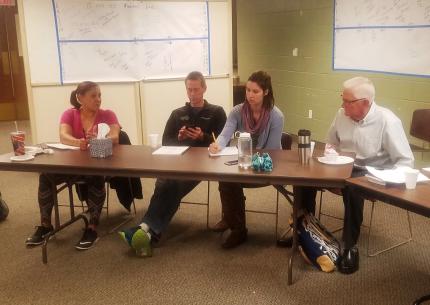CORR Keeps Fighting Racism

Participants in the CORR workshop at Oakdale Christian Reformed Church
Chris Meehan
This article has been removed pending edits.
Around the lunch table at a recent antiracism workshop, Deborah Armstrong, an African American woman, shared the story of a key moment in her relationship with Donna, who is white.Having met at Oakdale Park Christian Reformed Church in Grand Rapids, Mich., the two women had grown to be close friends and happened to be socializing with a group of people when the incident occurred.
“Someone made a [negative] remark about black people, and everyone got quiet. This had never really happened when I was with my friend,” remarked Armstrong.
Not wanting to speak up because Armstrong didn’t think people in the group would listen to her, she looked at Donna, putting her on the spot, giving her the chance to say something.
“I knew it was hard for her. Her face got all red, and she swallowed hard. But then she did say something,” making it clear that Armstrong was her friend and racist comments were out of line.
“It was so wonderful when she stood up for me. I felt so good,” said Armstrong.
Armstrong told the story as an example of a white person’s willingness, in a society in which blacks can frequently face cruel comments, to come out against racism.
Speaking out on behalf of minorities was, in fact, one topic among many addressed at the three-day antiracism workshop held Oct. 20-22 at Oakdale Park Church.
A frequent contributor at antiracism workshops, Armstrong was there to offer the views of a black woman to the mostly white group of people who attended the event, which was put on by Congregations Organizing for Racial Reconciliation (CORR).
“This has been very valuable for me,” said Kurt Visker, an Oakdale Park member who is white. “It gives us an important perspective and highlights a lot of history we weren’t taught going to school.”
Modeled after an existing program, CORR arose in the 1990s out of three Grand Rapids area Christian Reformed churches — Church of the Servant, Madison Square, and Coit Community. At the request of CRC officials, CORR began to develop and offer workshops and training for CRC congregations.
But in the mid-2000s, the Office of Race Relations of the CRC began its own program called the Dance of Racial Reconciliation (DORR).
Recently, however, the Office of Race Relations is creating closer connections to CORR.
“CORR has been doing this for 20 years. It is a faith-based organization that helps churches and others take it to a different level,” said Shannon Jammal-Hollemans of the Office of Social Justice. “Although this [racism] is a constant, ever-changing concept, CORR helps us learn and figure things out together."
During the morning session on Saturday, Oct. 21, group facilitator Laura Pritchard discussed the numerous ways over the years in which federal, state, and local governments found ways to deny blacks and other minorities the chance to buy a home where they wished.
Until changes in federal housing policy in the 1970s, blacks and other minorities were relegated or “redlined” into specific, often low-income neighborhoods, she said.
“We’re talking about legal, institutional racism. We’re talking about unfair housing practices,” said Pritchard. “We’re talking about how, even though the laws have changed, this is still going on today.”
As part of the workshop, Pritchard wrote a timeline of racism in the U.S. on large sheets of white paper that she taped to the walls in the basement of the church.
While she wrote, she talked, for instance, of how Native Americans were violently removed from their lands by European settlers. Moving on, she spoke about issues that led to the Civil War, discussed the slow integration of blacks into the nation’s armed forces, and highlighted the civil rights struggle of the 1960s — a fight that, she said, is still going on.
Mixing lectures, videos, question and answer periods, and small-group discussions, the three-day workshop was grueling and yet valuable as people faced their own shortcomings.
“It’s been a good education for me,” said Scott Krosschell, a deacon at Oakdale Park. “There has been a lot of self-evaluation as they have talked about white privilege and how, even though it is non-intended, we can prey on black citizens.”
He said it was hard to hear some of the black participants talk about their experiences. One woman, for instance, recalled her family moving into a white neighborhood in West Michigan and how confused she was when, at the age of three, she woke up to see a cross burning on their lawn.
“Hearing about the biases has been really hard,” said Krosschell. “But being here and listening is a good way to start moving toward reconciliation and maybe change.”
CORR starts with the workshops but doesn’t stop there. It also commits itself to supporting churches and organizations as they work to understand the dynamics of racism and to become more inclusive. This means CORR trainers will work with churches and others throughout the long process — following the workshops — of trying to fight and overcome racism.
With the core belief that all of God’s people deserve dignity, equality, and opportunity, CORR asks participants to face a hard history, examine themselves, and find ways to acknowledge that racism has long been and continues to be a sin.
“Coming here is essential for me,” said Tracy Anderson, a deacon at Oakdale Park. “ I am biracial, and because of my family history, I realize how important it is to know where we come from. Only by doing that will we know where we are going — and hopefully that won’t be to the same place.”
--->

